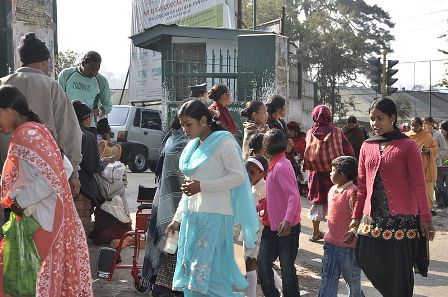in brief: one of world’s last surviving matrilineal societies “disempowers” its men

My Mum used to tell stories at bedtime, and one of my favourites was Upside Down World. Visitors to this realm would sip donuts through straws and slide backwards up slippery dips; the laws of our universe were reversed.
In The Age this week, Amrit Dhillon explores a society that sounds like a real Upside Down World: the Khasi tribe in India’s north eastern state Meghalaya is matrilineal.
‘In Khasi society,’ he writes, ‘Children take their mother’s surname, men move into their wife’s home after marriage and when children are born only the girls inherit the family assets.’ Reportedly, women own and direct businesses and lead much of family life.
Wow, that sounds great! Are there direct flights from Adelaide to Meghalaya’s capital, Shillong?
From where I sit, it’s encouraging to hear about a tribe of more than 1.2 million people (that’s the population of my city) where women are primary decision makers. In the West, we gals can be coached into being passive and “nice”, while assertive women are often criticised and mocked.
I’m excited to see the innate Khasi way of life elevating the status of women in India – a country notorious for widespread misogyny. First of all there’s the infamous fatal gang rape of a 23-year-old physiotherapy intern that brought the attitude of male sexual entitlement and violence to international attention. Then there’s dowry deaths, and foeticide – the murder of female babies because girls (are) considered a burden and liability. In Khasi communities, the arrival of a baby girl is celebrated because she will one day look after her parents.
But there is a rising movement against Khasi customs. Keith Pariat is president of Syngkhong Rympei Thymmai (SRT), an organisation advocating Khasi men’s rights. Pariat, who gave his daughter his surname in a brazen affront to his tribe’s traditions, has had enough of being seen as a second-class citizen.
‘Khasi male (sic) are seldom eligible for bank loans,’ declares SRT’s website, ‘as they do not have any assets to place as collateral.’
Pariat believes that Khasi society is destroying its men; they don’t have family authority, or any involvement in clan meetings and business. The lack of control is supposedly emasculating, and men have no sense of belonging.
‘You are just a breeding bull,’ Pariat says. ‘No one is interested in hearing your views about anything.’ He claims that disempowered Khasi men have fallen into lifestyles of drinking and drugs, and is keen to see men instated as the head of the family, and women the “heart”.
Despite Pariat’s rightful complaints, women don’t hold all the power. It must be noted that a woman’s decision needs to be okayed by a maternal uncle, says Hasina Kharbhih, head of the human rights NGO group Impulse Network. The Guardian reports that ‘all the chief government ministers are men and few women even sit on village councils.’
Even though female dominance is not absolute, it’s a marked difference to life in Australia. While the upside down Khasi world sounds preferable, there is a danger in creating opportunities for one sex and oppressing the other – that sounds a lot like patriarchy.


Hmm, I think my problem with the SBT is that (unlike feminism, for example), they’re not really seeking equality, so much as restating a patriarchal culture instead of the current matrilineal one.
One of the supporters of the movement is quoted as saying ‘Families are getting broken because men have no responsibility. They need to be head of the house to be respected.’
That’s just pushing ideals of a patriarchy, not equality. I agree that a society that is biased towards *either* gender is problematic, but this isn’t really the solution…
“…where women are primary decision makers”
But a matrilineal trible is not the same as matriarchal one, a female line of lineage does not necessarily imply female power, or even that women, as a whole, are more empowered. It is simply the maternal line that is empowered and, in particular, as mentioned, the maternal uncle. The stability of the family, as a whole, is favored over the individual rights of any one individual, female or otherwise.
For these reasons, I think it’s risky to use apply Western ideas of social liberalism and gender equality (“wow, sounds great”) on to these sorts of traditionalist family-centric societies because it gives a hazey picture of the true extent of social mobility.
This is true, Chris, I didn’t make the distinction between matriarchal and matrilineal. However, the impression I got from SRT’s website and the articles cited was that women have a lot more influence and respect in Khasi life than a lot of cultures throughout the rest of India.